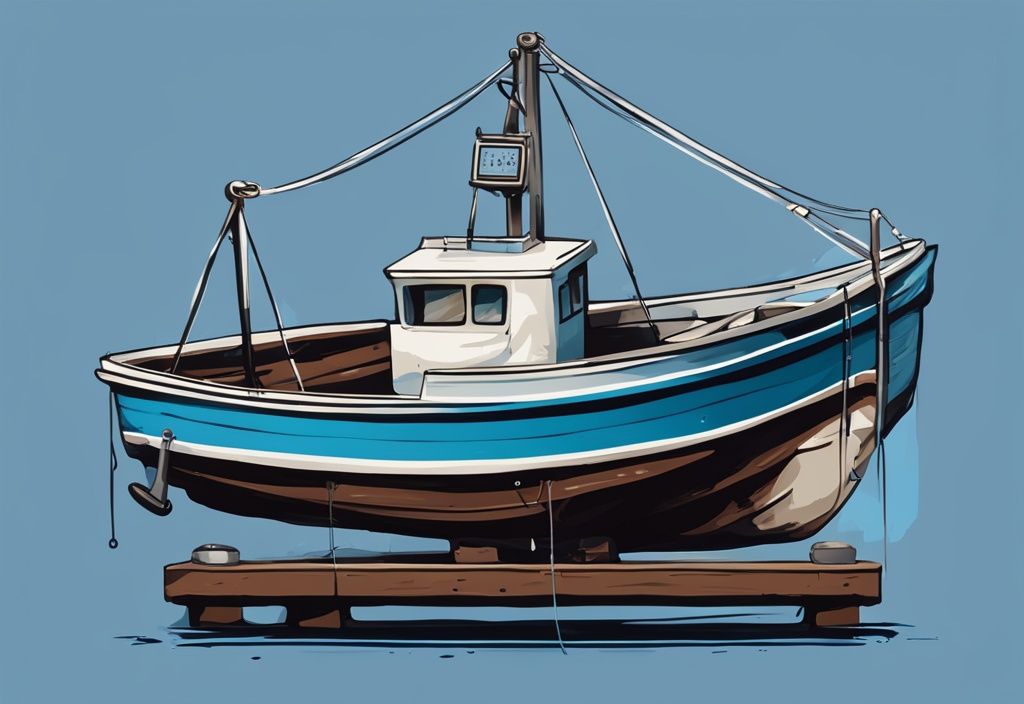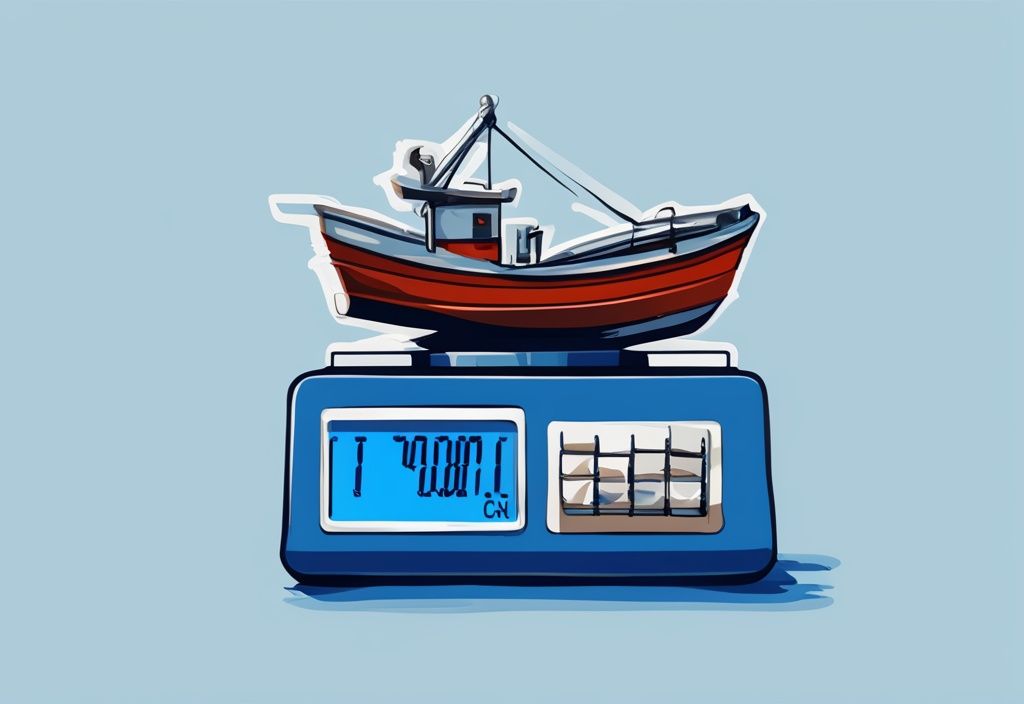Ever thought how much your loyal fishing companion, your boat, might weigh? And why does it matter? Well, strap in, as we’re about to dive into the importance of knowing your fishing boat’s weight.
Whether planning an off-shore adventure or heading to your favorite lakeside spot, the weight of your boat will decide much of your journey. It impacts everything from towing safety, fuel efficiency, to how smooth your trip will be.
In this brief, we’ll explore the key factors that affect the weight of your fishing boat – its size, materials, add-on equipment, and more. By the end, you’ll be well-armed with knowledge to ensure your fishing exploits are smooth sailing. Time to get our feet wet, eh?
Key Factors Influencing Fishing Boat Weight
A fishing boat’s weight is a game-changer, especially when it comes to towing. Wondering how much does a fishing boat weigh? You’ll need to look at size, materials, and purpose. The type of fishing boat and construction materials majorly influence its weight. Plus, any extra equipment or modifications can tip the scales further.
Why Knowing the Weight of Your Boat is Crucial
Knowing your boat’s weight is like knowing the tide schedule—essential for a smooth trip, especially when ensuring that you have the right trailer and safety equipment for towing your boat. For more information on safe towing preparation, check out this resource on boat towing and trailering. It ensures you pick the right trailer and towing vehicle, keeping you within safe towing limits. The weight also impacts the boat’s capacity, stability, and fuel efficiency, preventing overloading and ensuring both durability and safety.
Materials Used in Boat Construction
Materials are the building blocks that determine how much does a fishing boat weigh. Aluminum and fiberglass are the MVPs here. Aluminum boats? They’re generally lighter. Think about 650 pounds for smaller ones and around 900 pounds for the bigger models with robust motors. On the flip side, fiberglass boats pack more weight. Small models can range from 1,500 to 2,500 pounds, while larger ones can weigh up to 2,900 pounds. Steel and wood might pop up occasionally but they’re the rare guests in fishing boat construction.
Role of Boat Size and Type
Size and type are like the secret sauce for boat weight. Small fishing boats, like bass boats and kayaks, might only weigh around 250 pounds. Midsize fishing boats, which include cabin cruisers and offshore vessels, generally tip the scales between 4,000 and 8,000 pounds. And those large fishing boats, such as commercial trawlers? They can range from a hefty 10,000 to 40,000 pounds even when they’re sitting empty.
Additional Equipment and Modifications
Adding engines, fuel, and gear can bulk up a boat’s weight big time. Modifications like more powerful engines or gear upgrades can add even more heft. Oh, and don’t forget the boat trailer—that’s another 600 pounds, give or take, depending on its material and length. So, when you’re calculating how much does a fishing boat weigh, these factors are key for practical usage and safe towing.
Weights of Different Types of Fishing Boats
Different types of fishing boats vary significantly in their weights, materials, and functionalities. Knowing how much a fishing boat weighs is crucial for any angler, whether you’re prepping for a relaxing day at the lake or a rugged offshore adventure.
Small Fishing Boats: Bass Boats & Kayaks
Small fishing boats like bass boats and kayaks are all about ease and simplicity. Picture this: you, a sleek bass boat or kayak, and the tranquility of a calm lake. These boats weigh between 250 to 1,000 pounds, thanks to lightweight materials like aluminum or specialized polymers.
Their design allows for easy transport and nimble maneuvering, making them perfect for those serene fishing trips on lakes and rivers where every cast counts.
Medium Fishing Boats: Cabin Cruisers & Offshore Vessels
When it comes to medium-sized fishing boats, you’re looking at cabin cruisers and offshore vessels weighing anywhere from 4,000 to 8,000 pounds. These boats are tougher, built with heavy-duty materials like fiberglass to endure rougher waters. Imagine setting out for an extended trip with not just your fishing gear, but also the comforts of small living quarters, advanced navigation systems, and larger fuel tanks. These boats combine durability and amenities, making them ideal for moderate offshore fishing excursions.
Large Fishing Boats: Commercial Trawlers
Commercial trawlers, the giants of the fishing world, are built to handle the open sea’s toughest challenges. These large fishing boats can weigh between 10,000 to 40,000 pounds, even when not loaded with the day’s haul. Constructed with robust materials such as steel and high-grade fiberglass, they boast industrial-grade fishing equipment and vast storage capacities. Visualize heading out on a commercial venture, where every tool and feature is designed for efficiency and durability. These boats are indispensable for large-scale operations in deep-sea environments, perfect for harvesting substantial quantities of fish.
By understanding how much a fishing boat weighs across different categories, you’ll be better prepared for your next angling adventure. Whether you’re planning a leisurely day on the lake or a commercial fishing expedition, knowing your boat’s weight helps manage equipment and logistics, ensuring you have a safe and efficient fishing experience.
Impact of Material on Fishing Boat Weight
When pondering how much does a fishing boat weigh, the material it’s made from plays a pivotal role. Whether it’s the light touch of aluminum or the sturdy heft of fiberglass, the choice of material directly affects various aspects such as towing, fuel efficiency, and overall performance.
How Aluminum Affects Boat Weight
Aluminum is like the superhero of fishing boat materials—light, strong, and incredibly versatile. Picture this: you’re towing a small to medium-sized fishing boat to your favorite secluded lake. Thanks to aluminum’s lightweight properties, this boat generally weighs between 650 and 900 pounds, making it a breeze to handle and more fuel-efficient to boot.
The real charm of aluminum boats lies in their ease of towing and handling. Imagine zipping through the highway with minimal drag behind you, or effortlessly maneuvering your boat from the trailer to the water. For someone like me, who loves the freedom to explore different fishing spots, lighter aluminum boats are nothing short of a blessing.
This lighter weight significantly influences your towing requirements. A regular family car might do the job, sparing you from investing in a heavy-duty towing vehicle. Moreover, the agility offered by these aluminum wonders enhances overall performance on the water, letting you focus on what’s truly important—catching that next big fish!
Weight Implications of Fiberglass Fishing Boats
On the other end of the spectrum, you have fiberglass boats—rugged, stable, and somewhat like the gentle giants of the fishing world. A small fiberglass fishing boat can tip the scales between 1,500 to 2,500 pounds. Larger models? Think somewhere up to 2,900 pounds.
You might wonder, why opt for a heavier boat? The answer lies in their stability and durability, essential for those choppy waters and unpredictable weather conditions. More weight often translates to a steadier ride, which can make all the difference when you’re out there battling the elements.
However, this heft brings along its own set of considerations. Heavier boats usually require more powerful engines, boosting the overall weight even further. When you’re calculating how much does a fishing boat weigh, remember to factor in these additional elements. The weight of a fiberglass boat, combined with engines and trailers, can easily total around 5,000 pounds.
This added weight has significant implications for fuel efficiency and towing vehicle requirements. You’ll likely need a robust vehicle to tow it efficiently and a bit more fuel to keep that powerful engine running. But, for the stability and durability offered, many anglers find this trade-off well worth it.
Additional Equipment and Its Weight Contribution
Weight Impact of Boat Engines
Engines play a pivotal role in determining how much a fishing boat weighs. The size and type of the engine can significantly influence the overall weight, whether you choose an outboard or inboard engine. Larger, more powerful engines designed for higher speeds and better performance will add considerable heft to your boat. On the other hand, smaller engines may not drastically impact the weight but might fall short in performance, stability, or speed. It’s crucial to strike a balance between the engine’s power and your boat’s functional needs.
Imagine a sleek, well-equipped fishing boat gliding through the water at dawn, its engine purring with just the right vigor – that’s the sweet spot every angler dreams of. Keep in mind that an overpowered engine might turn your serene fishing trip into a constant struggle with your boat’s balance and fuel efficiency.
Understanding Trailer Weights
Boat trailers are another significant element that affects how much a fishing boat weighs during transport. The average trailer tips the scales around 600 pounds. However, this number can swing between 500 to 2,000 pounds based on the boat’s length and the trailer’s material. Steel trailers are generally heavier than their aluminum counterparts. When preparing for towing, account for the trailer’s weight to ensure you stay within your vehicle’s safe towing limits.
Picture your fishing adventure starting the moment you hitch your boat to the trailer. A well-matched trailer ensures a smooth journey to the water’s edge, while an ill-considered one might bring unexpected challenges. If you’re looking to enhance your fishing gear, learn how to make fishing lures for a more personalized experience. Proper planning here enhances both safety and performance on the road.
Weight Addition of Fishing Gear and Equipment
Fishing gear and onboard equipment can significantly add to how much a fishing boat weighs, influencing both performance and towing capacity. Essential items like rods, reels, and tackle boxes contribute to the overall weight. Additionally, extra onboard equipment such as fighting chairs, coolers, and electronic navigation systems further stack up the pounds.
Imagine casting off with your boat brimming with all the necessary gear, ready for a day of reeling in the big ones. Each piece of equipment, from your trusty tackle box to the latest fish finder, adds to the total load. This accumulation impacts the boat’s speed, fuel efficiency, and stability, so it’s vital to account for everything you plan to bring. By carefully managing the weight of your gear and equipment, you can not only optimize performance on the water but also ensure safety during transport.

Consider every item as part of a harmonious whole – each piece contributing to the perfect fishing outing. With thoughtful preparation, your boat remains agile and responsive, no matter how much gear you have aboard.
Finding Accurate Information About Your Boat’s Weight
Manufacturer’s Specifications
When you’re trying to figure out how much a fishing boat weighs, diving into the manufacturer’s specifications is your best bet. These figures are no joke—they account for design, materials, and even the standard perks each model comes with. Trust me, these guys have it down to a science.
Using this info, you’ll be making smarter calls about towing, storage, and basically handling your boat like a pro. Ever thought about how weight impacts your ride’s fuel efficiency, stability, and on-water performance? Yeah, the manufacturer’s got you covered there too. Following these specs not only keeps you safe but also ensures your boat lasts longer.
Weight Information in Owner’s Manuals
Owner’s manuals—never underestimate these bad boys when it comes to learning how much your fishing boat weighs. They’re packed with detailed, model-specific info, including weights for all kinds of setups and extras.
If you own a boat, this manual is like your boating bible. It helps you gauge the boat’s capacity and performance, which is golden when you’re planning a trip, doing some maintenance, or looking to pimp your ride with upgrades. It’s all about having the right details handy for a safer, smoother boating experience.
Online Resources for Boat Weight Information
We live in a digital world, my friend, and finding out how much a fishing boat weighs has never been easier. Manufacturer websites? They’re a goldmine for detailed weight specs of different models, and they often sport tools to compare boats side-by-side.
Plus, there’s a whole bunch of boating websites and forums out there. These platforms are chock-full of wisdom and stories from seasoned anglers and boat owners who share the nitty-gritty on boat weights. Not to forget those review sites and databases—they’re awesome for gathering exhaustive, comparative data to help you make the best decision for your fishing adventures.
FAQ
How do I find the exact weight of my fishing boat?
- Check the manufacturer’s specifications or owner’s manual. These documents often have all the details you’re looking for.
- If you don’t have the manual handy, head over to the manufacturer’s website or trusted boating resources online.

Why is knowing the weight of my fishing boat important?
Towing your boat safely and choosing the right trailer are crucial. Imagine setting off for a fishing trip only to find your boat swaying dangerously because you miscalculated its weight! Additionally, knowing the weight helps in monitoring your boat’s performance, fuel efficiency, and overall stability on the water.
Can the weight of my fishing boat affect fuel efficiency?
Absolutely. Heavier boats guzzle more fuel, plain and simple. Every extra pound means more effort for your engine, which translates to higher fuel consumption and increased operating costs. Want to save a few bucks? Keep an eye on that weight!
What kind of trailer should I use based on my boat’s weight?
Picking the right trailer is like finding the perfect fishing rod—it has to match your needs. Your trailer should comfortably support not only the boat but also any extra gear you’ve piled on. And don’t forget to ensure it’s within your vehicle’s towing capacity. Safety first, my fellow anglers!
Does a fishing boat’s weight influence its performance?
You bet it does. Heavier boats can be a double-edged sword; they offer more stability but trade that off with less fuel efficiency. Think about how handling, speed, and overall usability are affected. It’s all about finding that sweet spot between weight and performance.
Conclusion
Monitoring the weight of your fishing boat is essential for ensuring safety, performance, and efficiency. Knowing *how much does a fishing boat weigh* is crucial for any boat owner because the weight significantly affects how it can be towed, its stability on water, fuel efficiency, and operating costs.
Fishing boats come in various sizes and types, each with a specific weight range determined by the materials used and additional equipment. Small fishing boats like bass boats and kayaks typically weigh between 250 to 1,000 pounds, making them lightweight and easy to maneuver.
Midsize fishing boats, such as cabin cruisers and offshore vessels, weigh between 4,000 and 8,000 pounds and are built with more substantial materials and additional amenities. Large fishing boats, including commercial trawlers, can weigh from 10,000 to 40,000 pounds, even when empty, due to their construction designed to withstand rough conditions for large-scale operations.
The materials used in the construction of fishing boats also play a pivotal role in determining their weight. Aluminum, a popular choice for small to medium-sized boats, keeps the vessel lighter, ranging from 650 pounds for small boats to 900 pounds for larger ones. In contrast, fiberglass is heavier, with small fiberglass boats weighing between 1,500 to 2,500 pounds, and larger ones reaching up to 2,900 pounds. Steel and wood, while less commonly used, can also contribute significantly to a boat’s weight.
Additional equipment and modifications can dramatically alter a boat’s total weight. Engines, fuel, and onboard equipment such as fishing gear, fighting chairs, coolers, and electronic gear can contribute a significant percentage to the boat’s weight. Modifications like adding a larger engine or equipment upgrades also play a role. Don’t forget boat trailers, essential for transportation, can add around 600 pounds or more, depending on their material and length, and must be factored into towing calculations to ensure safety.
Accurate information about your boat’s weight is vital for proper towing and overall enjoyment of your boating experience. Manufacturer’s specifications and owner’s manuals offer precise details on a boat’s weight. Utilizing online resources like manufacturer websites, reputable boating websites, and forums can also provide relevant weight data.
Understanding how much a fishing boat weighs is not just about numbers but ensures that all measures for safety, performance, and efficiency are met. This complete knowledge allows you to make informed decisions, from selecting the right trailer and towing vehicle to ensuring that you stay within safe limits. This, in turn, extends the longevity of your boat and equipment and ensures a smooth and enjoyable fishing experience.


